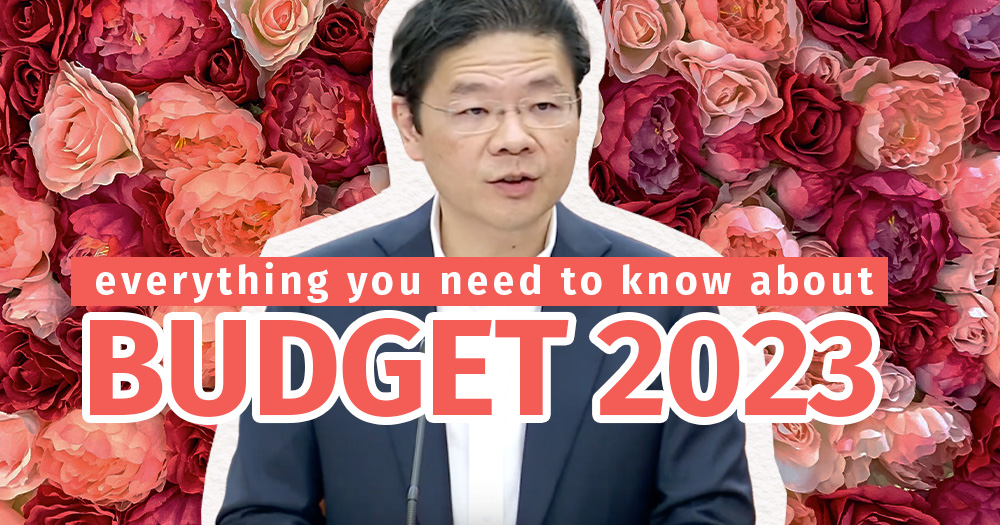Follow us on Telegram for the latest updates: https://t.me/mothershipsg
A day after Singapore relaxed Covid-19 rules and announced the standing down of the Multi-Ministry Taskforce (MTF), marking the country's emergence from the years-long pandemic, Finance Minister and Deputy Prime Minister Lawrence Wong delivered this year's Budget Statement "Moving Forward in a New Era" on Feb. 14, Valentine's Day.
Drawing on past reserves
This is Wong's second time on the budgetary stage, and he provided a breakdown of Singapore's fiscal position in 2022.
Due to the pandemic, the government had to draw a total amount of S$6 billion from past reserves to fund emergency Covid-19 public health expenditures.
Now that the situation has stabilised, Wong shared that they expect to draw a lower amount of up to S$3.1 billion from past reserves.
This brings the expected draw on past reserves from FY2020 to FY2022 to S$40 billion, lower than the initial S$52 billion draw the government had sought the President Halimah Yacob's agreement for.
"[This] reflects our prudent approach in using our reserves — drawing on them judiciously, only when there are compelling reasons to do so," Wong said.
Wong added that the higher spending, combined with the country's revenue upside, will lead to a slight deficit of S$2 billion, equivalent to 0.3 per cent of Singapore's GDP, for FY2022.
The last time Singapore drew on its reserves was during the 2008 Global Financial Crisis, and the government was able to put back the amount drawn within two years "due to the sharp recovery in the economy and in our fiscal position".
Now, although the economy has returned back to pre-Covid levels, Singapore continues to be "in a tight fiscal position", and Wong acknowledged that it is "highly unlikely" the amount drawn can be put back into the past reserves.
More financial help
In light of global economic uncertainties and rising inflation, Wong announced several fiscal measures to help Singaporeans tide through this period, as well as cushion the impact of the higher GST rates.
Enhanced GST voucher
The permanent GST Voucher (GSTV) scheme will be enhanced further so that it continues to defray GST expenses for eligible households.
For those residing in homes with an annual value of S$13,000 and below, the GSTV cash quantum will be increased from S$500 to S$700 in 2023, and to a further S$850 from 2024 onwards.
As for those residing in home with an annual value of more than S$13,000 and up to S$21,000, the GSTV cash quantum will be increased from S$250 to S$350 in 2023, and then to S$450 from 2024 onwards.
Enhanced Assurance Package
Other measures include cash payouts every December till 2027, an increase in CDC vouchers, a cost-of-living special payment, bonuses for seniors and enhanced U-Save Rebates.
Support for lower-wage workers
The government will top up S$2.4 billion to the Progressive Wage Credit Scheme (PWCS) fund.
This will transitional support to employers as they raise wages for their lower-wage employees.
Under the enhancements, the government will co-fund 75 per cent of worker's wages that are S$2,500 or below for the qualifying year of 2023.
For workers earning above S$2,500 and S$3,000 or below, the government will co-fund 45 per cent of the wages for the qualifying year of 2023.
Other similar announcements will provide wage offsets for persons with disabilities, as well as encourage firms to employ ex-offenders.
More flexible working arrangements for parents
To ease the costs of raising children, parents will see increased financial support through increased Baby Bonus Cash Gifts and enhancements to the Child Development Account.
Eligible working fathers of Singaporean children born in 2024 will also be given four weeks of paternity leave, more than the existing two weeks.
The government will also double unpaid infant care leave for each parent in the child's first two years.
Support for first-time homebuyers
To better support the housing aspirations of young Singaporeans, priority will be given to first-timer families with children and young married couples aged 40 and below buying their first home.
The support given to this specific group ranges from an additional ballot for their Built-To-Order (BTO) flat applications as well as an increase in the CPF Housing grant for first-timer families purchasing resale flats.
Changes to CPF for platform workers
To strengthen protections for platform workers and improve their housing and retirement adequacy, platform companies will be required to make CPF contributions for workers below the age 30.
Meanwhile, these workers will also be required to make increased CPF contributions.
Older workers can choose to opt in for the increased CPF contributions, while those above the age of 65, or earn between S$50 and S$500 a month will enjoy CPF contributions from their platform companies, without the need to increase their own CPF contributions.
The government will raise the CPF monthly salary ceiling gradually over the next four years
Changes to tax system
Towards the end of his speech, Wong announced a slew of adjustments to Singapore's tax system.
From today (Feb. 14) onwards, tobacco excise duty across all tobacco products will be raised by 15 per cent.
The marginal buyer's stamp duty (BSD) rates for higher-value residential and non-residential properties will also be raised.
Buyers of high-end cars will have to pay higher taxes from the next COE bidding exercise, with a new additional registration fee (ARF) tier.
Singapore will implement a Domestic Top-up Tax (DTT) that will top up the Multi-National Enterprise (MNE) groups' effective tax rate to 15 per cent.
Top photo from Lawrence Wong / FB
Here's a video you might be interested in...
If you like what you read, follow us on Facebook, Instagram, Twitter and Telegram to get the latest updates.
